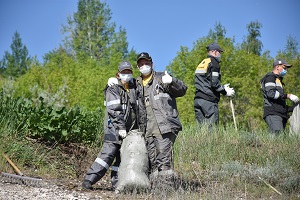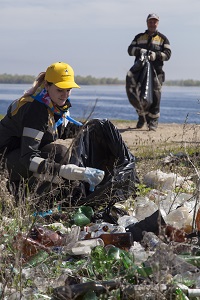Please activate JavaScript in your browser to use all interface options.
Rosneft Employees Cleaned 20,000 m2 Of Coastal Areas For Volga Day
20 May 2021
Rosneft enterprises in the Volga Federal District took part in an environmental campaign to clean up coastal areas within Volga Day. Oil workers collected and removed more than 7 tons of household and river waste, cleaned 20,000 m2 of the coastal territory. The action was attended by employees of the Novokuibyshevsk Oil Refinery, the Kuibyshev Oil Refinery, the Syzran Oil Refinery, and the Saratov Oil Refinery.
By implementing environmental programmes and applying new technologies, Rosneft's enterprises make a significant contribution to the conservation of the Volga Region's water resources. As part of the refinery modernisation program, the Companies built and upgraded water treatment facilities, which made it possible to reduce water intake from the Volga River by 6% or by almost 25 million m3 over three years and to increase the share of recycled water to 94-100%.
Novokuibyshevskiy, Kuibyshevskiy and Syzranskiy refineries are introducing innovative complexes for biological wastewater treatment. Among them is the most advanced membrane bioreactor technology, which significantly improves the quality of wastewater treatment.
A groundwater monitoring system was introduced using observation wells at the Novokuibyshevsk Refinery.
 The Syzran refinery continues to modernise its recycling water supply system by reconstructing two sections of the recycling water supply unit that provide cooling and water supply to process units.
The Syzran refinery continues to modernise its recycling water supply system by reconstructing two sections of the recycling water supply unit that provide cooling and water supply to process units.
In 2021, the Syzran Refinery put into operation a mobile ecological post for monitoring water and soil. The mobile laboratory is equipped with modern equipment that allows to assess on-site the quality of natural, waste, block-circulating water, to take soil samples under current standards, and to determine with high accuracy the physicochemical properties of water and soil.
New highly environmentally friendly marine fuel RMLS 2020 production has been launched at the Syzran refinery and TMS type A fuel production at the Novokuibyshevsk refinery in 2020. Both oil products quality is fully compliant with the International Convention for the Prevention of Pollution from Ships (MARPOL).
The Kuibyshev refinery has reduced its consumption of water from natural sources by almost 20% over the last five years. To this end, the recycling water supply units, ductwork, and water intake were reconstructed.
The Saratov refinery is also working to increase the volume of reused wastewater.
For more than ten years, the enterprises of the Samara site have been working to replenish aquatic biological resources to preserve biological diversity and increase the population of fish fauna. Fry of valuable fish species are released into the Volga waters: sterlet, carp, silver carp. In 2020, almost 800,000 fries were released into the river.
The effectiveness of the environmental policy of Rosneft's enterprises in Volga Federal District has been repeatedly noted by experts in regional and national competitions. The enterprises became winners of the Leader of Environmental Protection in Russia competition in 2018 through 2020.
Note for Editors:
Rosneft is one of the world's oil and gas leaders, participating in the international rating in the Water Resources category under the CDP project.
Rosneft's activities were rated "B–", which corresponds to the world average. A total of 2,435 companies took part in the rating, including 109 oil and gas companies from 28 countries. A high assessment of the activity testifies to the effectiveness of the Company's policy aimed at conserving water resources.
Preservation of unique water bodies is one of the priority tasks set in the Presidential Decree No. 204 "On National Goals and Strategic Objectives of the Russian Federation Development by 2024" dated May 7, 2018. The project should ensure the environmental improvement of water bodies and carry out measures to clean up the banks and coastal waters of Lake Baikal, Lake Teletskoye, Lake Ladoga, Lake Onega and the rivers of the Volga, Don, Ob, Yenisei, Amur, Urals, and Pechora.
An integrated approach to solve the problems of the river basin is implemented in the priority project "Preservation and prevention of the Volga River pollution" approved by the Russian President and in the federal project "Rehabilitation of the Volga". Its goal is to improve the ecological state of the Volga by the end of 2024 by reducing the volume of polluted wastewater and restoring water bodies in the lower reaches of the river.
The Volga is the largest river in Europe. There are national parks, state nature sanctuaries and reserves on the banks of the Volga River.
Rosneft
Information Division
May 20, 2021

-315xx70.png)

